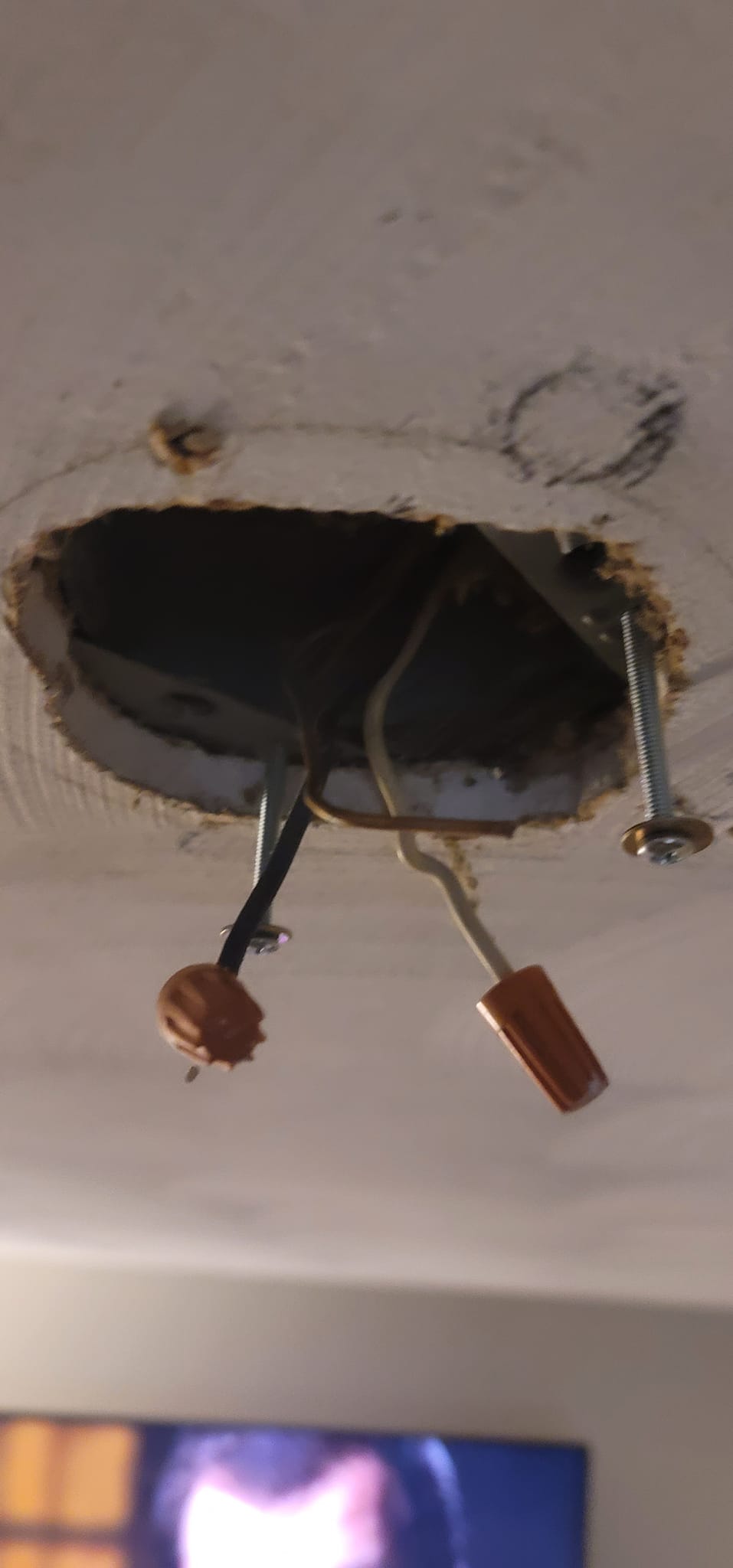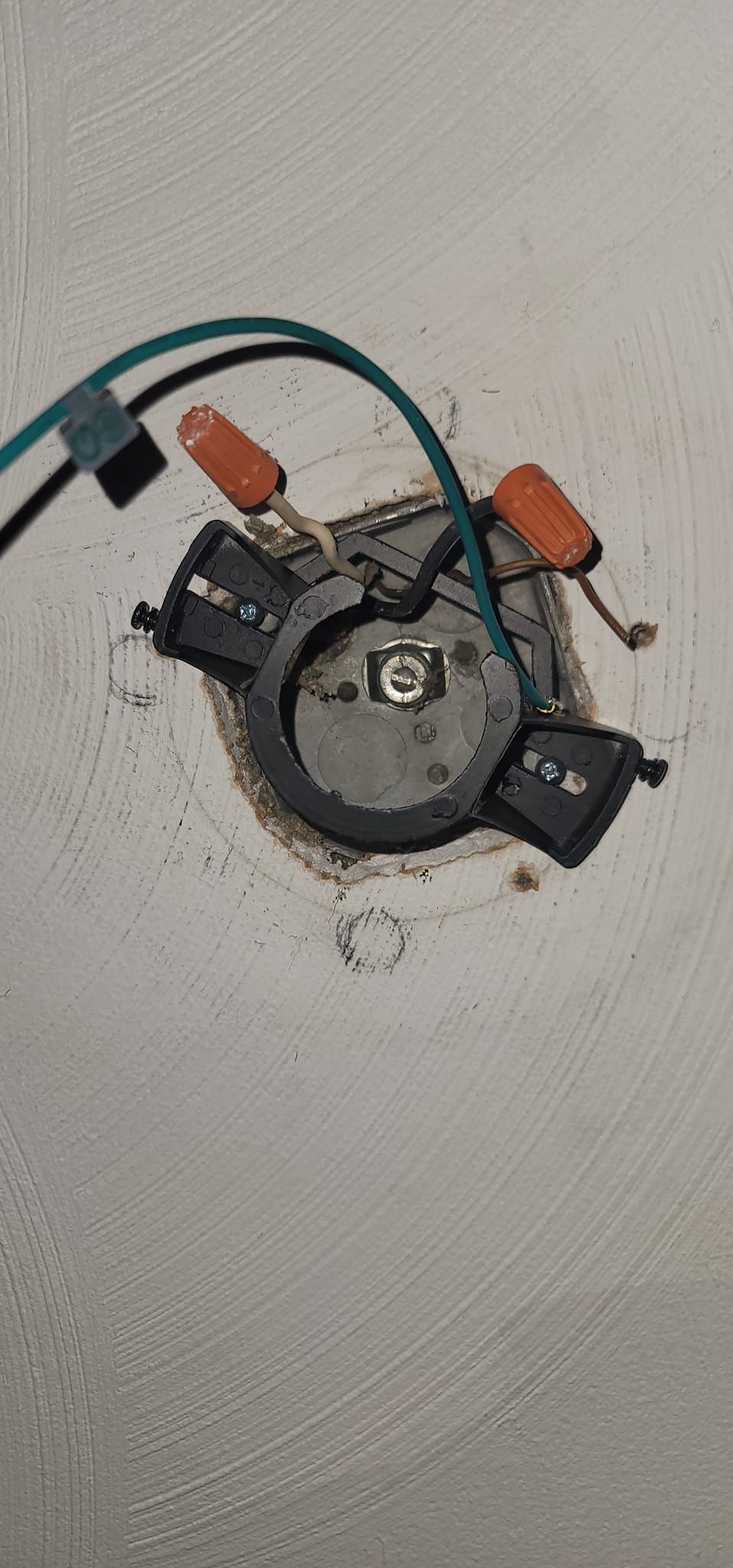Any tips on fixing a ceiling fan with a faulty light function and a makeshift bracket attachment causing drywall damage?
11 months ago
Last Updated: July 26, 2024
Hey there! I could use some help with my ceiling fan situation. I’ve checked out a few posts about it, but I’m not sure if they quite fit my issue. I recently took down my old fan and realized it was installed with two brackets resting on the drywall, like in picture number 1. The fan itself is secure, but the light function isn’t working. I found a box under the makeshift hanger, picture 2, and when I attached the bracket to it, it seems like the drywall is getting pulled past the box and cracking. Should I try to remove the box, or is it necessary to do so? Just for fun, I tested the ceiling fan on it, and it slightly rocks left and right, but it’s sturdy back and forth. Any advice would be much appreciated!


If possible, replace it with a fan-rated box.
There have been times when I had to use nuts to create a metal-on-metal connection.
This is an older method, it seems like they inserted a long screw in the center of the metal box. The screw is meant to go through a 2×4 or a piece of wood to provide support. If you have access to the attic, you can verify this. Many newer fans come with a stainless cable designed for additional support. Typically, we would drill and secure that cable to another piece of wood… You might consider adding washers to the two screws connected to the box to distribute the weight of the new bracket. Some people even use grk bolts through the metal box.
That box over there seems like it was a DIY job, probably added later to install a ceiling light. It’s just resting on the drywall, but ideally should have been cut into it to sit flush with the surface of the room. Another possibility is that the previous owners layered drywall over an old plaster ceiling. In any case, it’s not safe for a fan and should be replaced. Try loosening the large nut in the center without removing it to see if the box moves. This might give us more information. It would also be useful to know what’s above this room – another room or an attic perhaps? Do you feel comfortable working in attics? There are different approaches we can take here.
There’s an attic above this area, but you need to be invisible to access it. The entrance to the attic is a 15 x 15 square. I’ll work on loosening it up and update you later.
I wouldn’t rely on plastic to support a spinning motor.
Mentioned that the cast metal brackets also tend to crack and break. When he was inexperienced and attempted to do his own electrical work, he discovered this while removing a 42-inch fan from a 12-foot ceiling. After loosening the cover over the electrical box and climbing down the ladder to get a wire tester, the entire fan dropped 6 feet and was only held up by a small home automation control wire. Christopher then proceeded to remove the box from the rafter and disconnect the black, white, and ground wires. The mounting bracket was found to be made of cheap pot metal. He then mounted a new fan using a threaded rod in the roof rafter.
This needs to be removed, it looks unsafe. You can purchase a box with a rod attached that will brace between the joists. This type of setup is called old work, it’s very effective and can be installed in a small hole. Check out this link for more details: https://www.lowes.com/pd/RACO-1-Gang-Metal-Old-Work-Ceiling-Fan-Electrical-Box/3127059?store_code=180&cm_mmc=shp-_-c-_-prd-_-elc-_-ggl-_-LIA_ELC_206_Conduit-Fittings-Boxes-_-3127059-_-local-_-0-_-0&gbraid=0AAAAAD2B2W-oLiGslTSqyHJPQoS61rrqN&gclid=EAIaIQobChMIv_TJqeThgQMVxWByCh3ANwrpEAQYASABEgJy6_D_BwE&gclsrc=aw.ds
Hey Shawn, I already have that. The issue is figuring out how to get this box out. That’s why I asked if it’s necessary to remove this one.
Hey , you’ll have to remove it. You might need to do some drywall repair afterward. 😕.
You can find metal fan boxes specifically at stores like Home Depot or Rona. Remove the current one and replace it with a new one that has proper support. Then you can hang your fan on that. Remember to secure the seismic wire properly!
The box on the ceiling was actually the right one to use. However, in this situation, it wasn’t necessary since the ceiling is flat. That particular box is meant for angled ceilings. The other image is a bit unclear. Those metal pieces might be running between the joists, but it’s hard to say for sure. Reach in there and feel around. It’s possible they are resting on Sheetrock and easy to remove.
Get that thing out of there any way you can. Replace it with the correct fan box that attaches to the joists as previously mentioned. You have the option of patching the drywall or trying what worked for me… the light in my dining room was off-center and it bothered me until it got fixed. I covered the hole with a medallion.
That’s not a suitable box for a fan.
What I like to do is connect an octagon to wood. I add a diagonal brace between each pair of joists. I secure my octagon to that and typically use a few 3/4 inch plywood strips ripped to fit between the joists for proper spacing. I also include washers with the screws and usually insert an 8-32 hex nut inside the box to ensure everything stays tight and secure. I test it by hanging weight from the brace. However, keep in mind that this method involves cutting a portion of your ceiling and may not be suitable for all situations. I follow this process for any box that may potentially support a ceiling fan in the future.
Ends well.